Tag Archive: beginning communicator
December 7, 2013
by Carole Zangari -

Scene 1 Alex looks at the picture symbol choices placed in front of him and knocks them to the floor. Simone looks distressed while she waits for her lunch and whines as she watches her classmates eating. Jason smiles engagingly and rocks enthusiastically when his favorite aide enters the room. Kyra takes a picture from her PECS book and begins to chew on it. Scene 2 “He can’t even make choices. I’m not even sure what he wants.” “She really doesn’t communicate.” “He doesn’t mean anything by it. He does that all the time.” “She needs hand-over-hand prompting for everything.” Great kids, caring professionals. Ineffective communication. This month, we focus on ways to support children and adults at the earliest stages of communication. It isn’t easy trying to figure out how to provide effective SLP services to individuals who are not yet sending messages intentionally. Communicators at the pre-intentional level are... [Read More...]
Filed under: Strategy of the Month
Tagged With: beginning communicator, Communication Matrix, perlocutionary stage, preintentional communication
November 30, 2013
by Robin Parker -
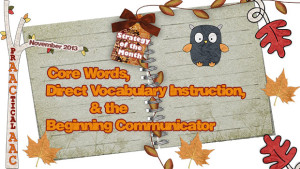
Direct vocabulary instruction is important for all level learners. The beginning communicator needs to learn core word vocabulary from USING the words and one of the best ways to learn how to USE core words, is to receive specific direct instruction with many opportunities for active participation. 6 Essential Philosophies & Strategies Vocabulary instruction involves a systematic TEACHING process. Add vocabulary or Words as an activity on the daily schedule and then have a mini-schedule for the specific vocabulary instruction activities for that day. Initially, apply an errorless learning paradigm. Then, gradually, add comprehension checks, but do not wait for ‘proof’ of comprehension before adding new words because we often notice that the beginning communicator will demonstrate comprehension during ‘unexpected opportunities- or when you are least expecting it. Once learners become familiar with some of the specific vocabulary activities, then have some choice making opportunities as to which ‘word activities’... [Read More...]
Filed under: Strategy of the Month
Tagged With: beginning communicator, vocabulary instruction
September 14, 2013
by Robin Parker -
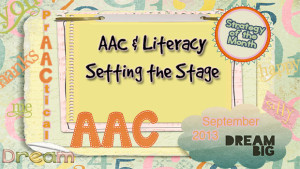
Literacy is for all students. As with most things we learn, emergent readers and writers need to be active participants with print across multiple settings and in multiple meaningful experiences. Emergent readers need to be taught to integrate reading and writing with communication and language. To facilitate this comprehensive integration and understanding, SLP’s and educators can use a variety of authentic research based strategies to help. Create a literacy enriched environment- Literacy skills are promoted through an environment with lots of reading and writing materials. Text based labels and signs will help bring meaning to text in authentic experiences. As you plan activities, include options for writing time/centers, and reading time/centers. Have books accessible to learners. Have lots of book options, but also help students independently turn pages (make it easy with page fluffers), reach books, use writing materials, etc. During interactive activities, give learners a choice of 2 or more books to... [Read More...]
Filed under: Strategy of the Month
Tagged With: beginning communicator, emergent literacy, literacy
April 4, 2013
by Carole Zangari -
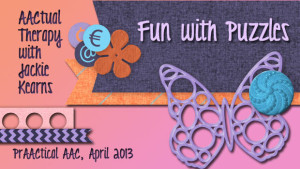
Today, we’re pleased to introduce SLP Jackie Kearns, coordinator of the Technology Resource Center at the Cleveland Clinic Children’s Hospital for Rehabilitation. Prior to that, she received her bachelor’s and master’s degrees from Ohio University. She completed both an undergraduate and graduate level thesis and has published in Contemporary Issues in Communication Sciences and Disorders. Jackie has over 5 years’ experience working with medically complex children in both inpatient and outpatient hospital settings. She has provided numerous AAC evaluations and treatment for children ranging from 1-21 years of age. In addition, she has done numerous presentations and in-services for staff at the Cleveland Clinic. We’re grateful to Jackie’s AAC professor and mentor, Dr. John McCarthy for recommending her to us. Therapy Activity: Fun with Puzzles Intended audience: Early intervention, preschool aged children, and/or emergent AAC communicators Type(s) of AAC: Eye gaze, reaching Picture communication symbols Single message voice output communication... [Read More...]
Filed under: PrAACtical Thinking
Tagged With: AACtual therapy, beginning communicator, Jackie Kearns, play, puzzles
March 23, 2013
by Robin Parker -
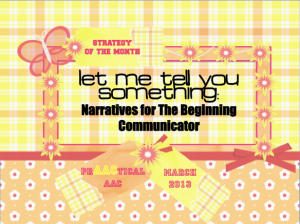
March continues with story telling or narratives as the Strategy of the Month. All learners have stories to tell but some may need special teaching to be able to express their stories. Goals for the beginning communicator can and should include narratives. Personal narratives are a good place to begin but any type of narrative can be taught with structure, routines, partner support, prAACtical strategies. Robust communication includes story telling. Yes, beginning communicators need to be able to express wants and needs however, authentic and comprehensive language involves much more. The quicker we start teaching, the quicker beginning communicators (or anyone) can learn. Beginning Communicator Narratives 3 Types (Just some of the options) Remnant Books are a visual and tactile way of telling stories by recording important events. Learners can help choose items from meaningful personal experiences which serve as a reminder of stories to tell. Create routines and visual supports... [Read More...]
Filed under: Strategy of the Month
Tagged With: beginning communicator, narratives, strategies
January 12, 2013
by Carole Zangari -
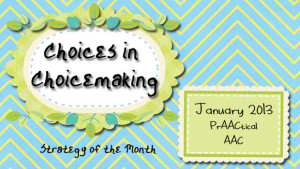
Choicemaking and requesting may be the most frequently targeted areas for beginning communicators who are starting out with their AAC systems. That makes sense for some learners because making choices is a very concrete focus for interaction and is loaded with motivational power. It seems pretty straightforward but, like anything else we do clinically, there are lots of decisions and choices to be made as we delve deeper into the process. How can we craft an AAC system that targets requesting for now, but also supports core language learning? For communicators who are at the earliest stages of making requests with AAC symbols, the strategy we discussed earlier this month or simple choice boards are a good starting point. But unless we quickly address where this is all going, the client will be strictly limited in their language learning. There are many ways to do this. Here is one approach.... [Read More...]
Filed under: Strategy of the Month
Tagged With: beginning communicator, choice, choicemaking, core vocabulary, requesting
November 10, 2012
by Robin Parker -
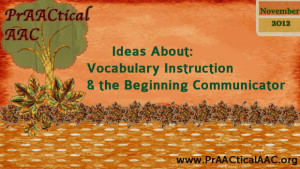
Vocabulary instruction is a topic not often discussed for beginning communicators. As we work with beginning communicators the primary focus is often vocabulary selection for communication displays. This is understandable as the beginning communicator has many needs, but that is no excuse for leaving out vocabulary instruction. Direct vocabulary instruction helps expand broader vocabulary selection options, literacy skills, and world knowledge. With that in mind, see below for vocabulary instruction philosophies, notes, and activities for the beginning communicator. Please let us know about your favorite vocabulary instruction activities. Vocabulary Instruction for the Beginning Communicator: 5 Philosophies Vocabulary instruction involves a systematic TEACHING process. Add vocabulary as an activity on the daily schedule and then have a mini-schedule for the specific vocabulary instruction activities for that day. Carole introduced general steps for vocabulary instruction last week. For the beginning communicator, also apply an errorless learning paradigm. Gradually, add comprehension checks, but... [Read More...]
Filed under: Strategy of the Month
Tagged With: beginning communicator, communication, language, language facilitation activities, teaching, vocabulary






